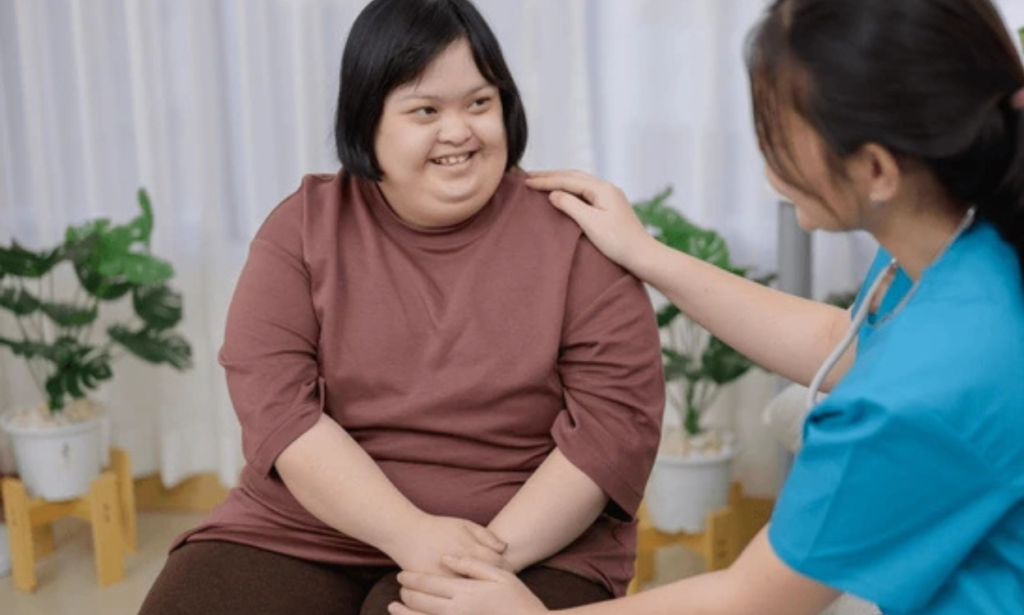


Maintaining bodily functions, avoiding diseases, and promoting general well-being all depend on older persons’ being hydrated. Encouragement of good hydration practices may be difficult, particularly for people with particular requirements like those with Down syndrome.
This blog will go over how older persons—including those with Down syndrome—may benefit from good hydration practices and offer useful advice to complement this vital component of their health regimen.
Older people’s capacity to stay hydrated determines their cognitive function, supports physical health, and aids with digestion. Our bodies lose their capacity to retain water as we age; our sense of thirst may also fade.
Dehydration resulting from this may increase our risk of kidney stones, urinary tract infections, and heat-related disorders.
Regarding hydration, those with Down syndrome may find extra challenges. Some usual concerns include physical limits, difficulty detecting thirst, or communication difficulties that impede articulating the need for a drink.
Moreover, several treatments or disorders prevalent in individuals with Down syndrome—such as thyroid difficulties or heart diseases—can raise dehydration risks.
Make sure water is always within reasonable reach. Place water bottles in common areas and near their typical sitting locations. To support regular drinking, think about including a water pitcher or dispenser in the kitchen.
Create a routine to ensure consistent hydration. Remind your loved one to drink water at specific times of the day, such as after meals or at specified intervals all through the day.
To boost hydration without depending just on water, toss high-water-content fruits and vegetables, including cucumbers, oranges, and strawberries, into meals and snacks.
Older persons or those with Down syndrome may find plain water unattractive at times. Add natural flavors like lemon, lime, or mint to make drinking more entertaining.
Count the daily fluid intake to make sure your loved one is obtaining the appropriate hydration. This is especially important if their health problems demand specific hydration intake.
Limit liquids that stimulate urine output, including coffee, alcohol, and sugary sodas, since they could exacerbate dehydration. Rather, emphasize water, herbal teas, or low-sodium broths.

People with Down syndrome could need special care about hydration. Cognitive capacity varies; consequently, it might be essential to offer more frequent reminders and monitoring. Thickened drinks can also aid some people, particularly if swallowing causes them anxiety.
One must be aware of the symptoms of dehydration, which could consist of:
Should any of these symptoms be seen, it is advisable to respond fast by drinking more fluids and, if needed, seeing a doctor.
Maintaining general health and avoiding difficulties depend on older persons, particularly those with Down syndrome, adopting good hydration practices. Understanding the particular difficulties and using sensible plans can allow caregivers to make sure their loved ones are healthy and hydrated. Recall that sustaining body functions, increasing energy levels, and enhancing quality of life all depend on hydration.
Call to action:
Start using these hydration recommendations right now if you are looking for an older adult or someone with Down syndrome. Safe Haven Community Living offers more tools and individualized advice on helping people under your care to be healthy.
In older persons, hydration maintains cognitive health, helps to preserve body functioning, and helps to avoid issues connected to dehydration.
Though personal requirements may vary, older persons should try for around 8 cups (64 ounces) of water daily.
Remind people often, offer water-flavored choices, and make sure fluids are easily accessible all through the day.
Among the signs include dry mouth, black urine, vertigo, and disorientation.
Indeed, foods with high water content—such as cucumbers, melons, and oranges—are fantastic for preserving hydration.